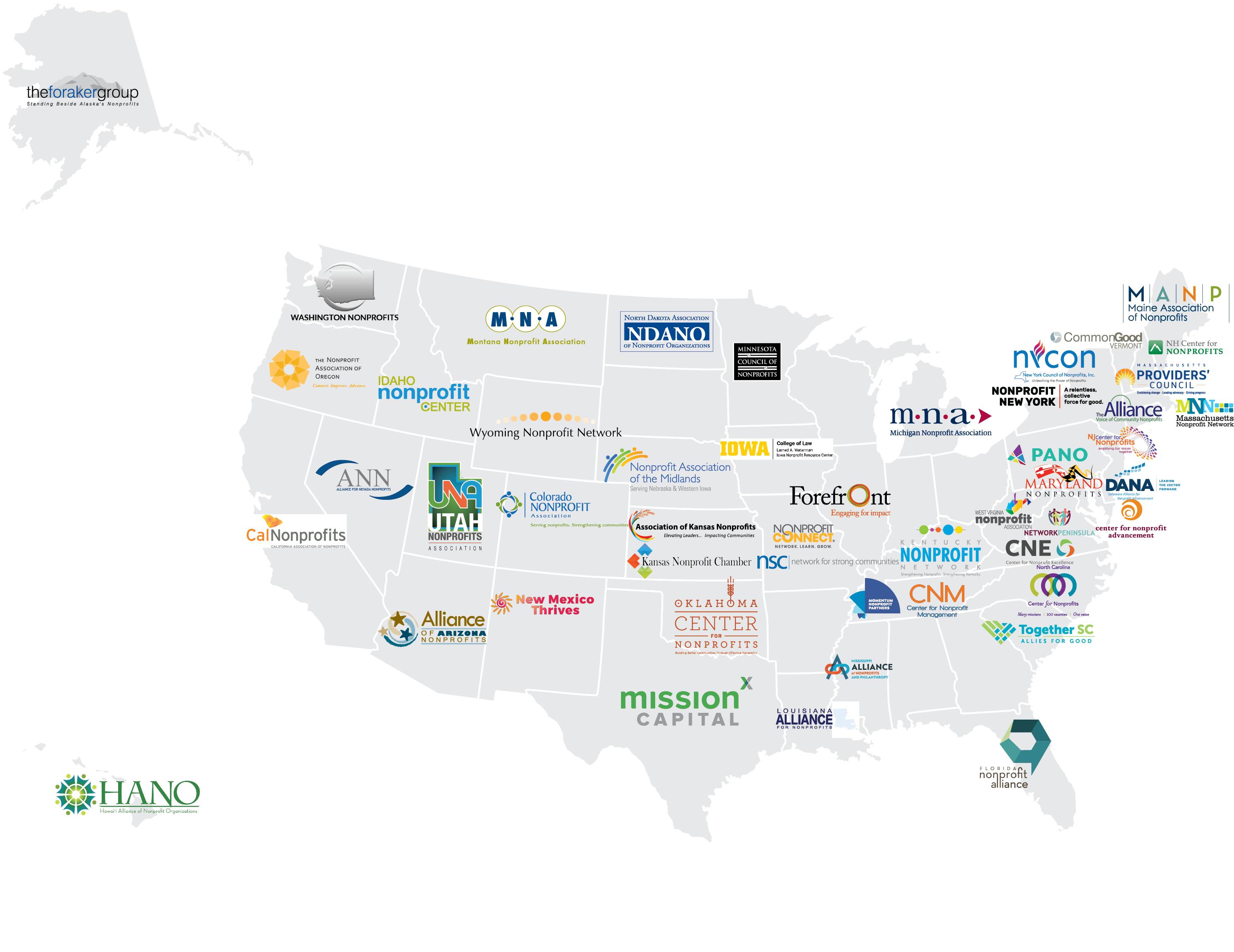

The National Council of Nonprofits is a trusted resource and leading advocate for America’s charitable nonprofits. Through our powerful network of state associations and 25,000-plus members—the nation’s largest network of nonprofits—we serve as a central coordinator and mobilizer to help nonprofits achieve greater collective impact in local communities across the country. We identify emerging trends, share proven practices, and promote solutions that benefit charitable nonprofits and the communities they serve.
To operate effectively, charitable nonprofits in local communities throughout the country need access to timely, trustworthy information on operational, legal, and capacity-building matters.
Nonprofits also need an informed champion to evaluate public policy developments of common concern at the local, state, and federal levels. Then, they need a partner to advocate for them—and alongside them—regularly in legislative bodies and regulatory agencies, and occasionally in the courts.
Nimble advocacy is key, because policy proposals that hold enormous sway over the ability of nonprofits to succeed—such as imposing new taxes, limiting charitable giving incentives, setting burdensome regulations, or interfering with independent decision-making—often erupt without warning, requiring swift, surefooted, and coordinated responses.
Finally, charitable nonprofits need the public, policymakers, and the philanthropic community to understand how they operate, the challenges they face, and the value they contribute.
We’re the central link connecting the largest nationwide and sector-wide grassroots “network of nonprofit networks.” Through our core network of state associations of nonprofits, we have more than 25,000 organizational members from coast to coast. We extend our core network for added advocacy strength with our member State Policy Allies, national nonprofits with state policy operations, and other collaborative partners. Our unique structure—and the operating culture we’ve developed over the years—provides us with access to real-time information about what’s occurring “on the ground,” giving us real-world knowledge and insights that are unmatched in the sector. We continually gather, analyze, synthesize, and circulate information. This reciprocal process of information exchange up, across, and through our networks and beyond strengthens nonprofit advocacy, capacity building, and effectiveness.
Of the 1.3 million charitable nonprofits registered with the IRS, the vast majority are small and midsized. Ninety-seven percent have annual budgets of less than $5 million; 92 percent spend less than $1 million; 88 percent less than $500,000. Many of these organizations—such as local food banks and neighborhood health clinics, senior centers and arts groups, and hundreds of thousands more—depend on the free access we provide to timely information, policy analysis, and applied advocacy they need to deliver their missions to people in local communities.
Our distinctive integrated approach to public policy enables us to recognize emerging patterns, identify opportunities and threats of greatest relevance to charitable nonprofits, build on policy successes throughout the country, and challenge flawed policy proposals with data, experiences, and real-world context. Through direct advocacy, behind-the-scenes action, and our work with mainstream media, we ensure a strong nonprofit presence before the federal government, in state capitals, and at city halls.
Other national groups properly focus on the specialized needs of their members’ subsector issues, such as the multitude of groups focused on aspects of health care and the 100+ philanthropy-serving organizations tending to foundations and other funders. We recognize and celebrate the specialized roles they play. But some policy matters transcend specific subsectors. Indeed, focusing exclusively on one tree can block sight of the forest fire raging nearby. As Aristotle observed, sometimes the whole is greater than the sum of its parts. That’s why we look out for the whole, the issues of mutual concern to all subsectors of the 501(c)(3) community. Those sector-wide issues include tax policy (e.g., income, property, and sales taxes), regulatory oversight, employment, nonpartisanship, and much more. While subsector specialists focus on the good of their causes, we focus on the common good of the sector.
We’re not a think tank or infrastructure group that talks about what needs to be done; we do it. We focus on impact and action, leading to outcomes that demonstrably improve the operating and policy environment on which all nonprofits rely.
Contributing to the work of the National Council of Nonprofits is like investing in an index fund: with one donation, you can advance the work of tens of thousands of charitable nonprofits impacting individuals and communities from coast to coast and border to border.